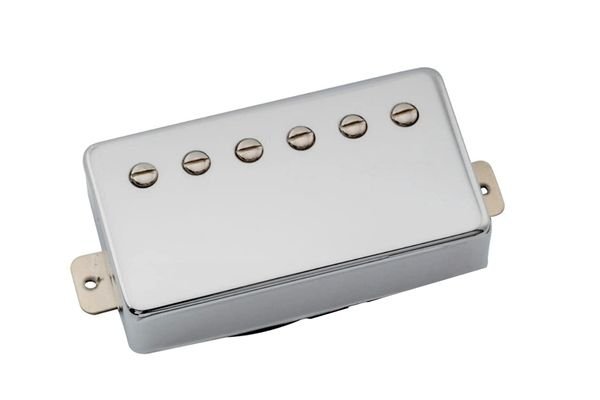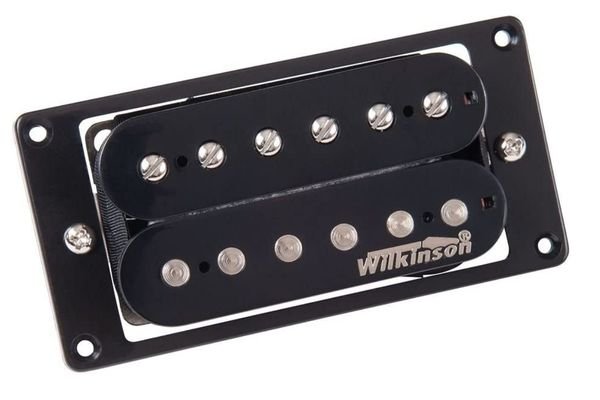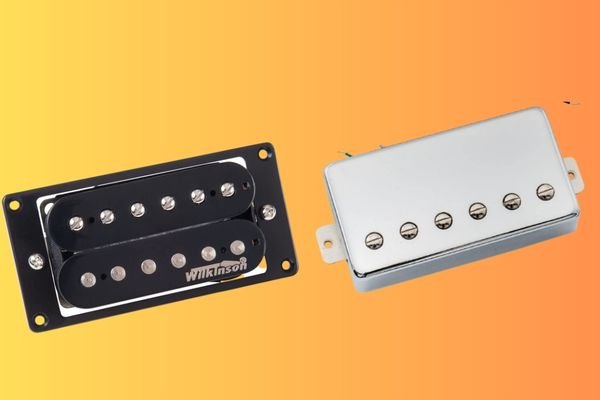Covered humbuckers are encased in a metal cover, while uncovered humbuckers are exposed with no cover. In 1955, two inventors named Seth Lover and Seymour Duncan introduced humbucker pickups, which revolutionized the world of guitar tones. Choosing pickups between covered vs uncovered humbucker may impact tonal quality, durability, and more. Let’s have a clear view of the differences between covered vs uncovered humbucker, their advantages and drawbacks, and find out which one is perfect for you.
What is Covered Humbucker?
A covered humbucker is a specific type of guitar pickup with a metal cover encasing the pickup’s coils. This cover gives a unique aesthetic to your guitar and has an impact on the tone. The cover reduces electromagnetic interference that can interfere with your pickup’s signal.
Covered humbuckers help produce a smooth, warm sound with a more vintage or classic rock vibe. If you worry that a covered humbucker may sacrifice power or sustain, in fact, covered ones pack a real punch and offer a thick, full-bodied tone that cuts through the mix without any noise.

Characteristics of Covered Humbucker
First and foremost, the cover helps to reduce unwanted noise and interference. So, a covered humbucker is a great choice for high-quality, clear sound. The metal cover also gives the humbucker its distinctive tonal character, adding a smoothness you won’t find in uncovered humbuckers.
Then comes the visual aspect. The cover gives the humbucker a sleek and sophisticated look with a range of finishes. You can opt for a classic chrome or nickel look or a vintage gold cover that adds flair to your guitar.
Pros and Cons of Covered Humbucker
Here are the pros and cons of covered humbuckers:
Pros:
- Covered humbuckers are protected from dust, moisture, and other external factors.
- The cover gives the guitar a more vintage or classic appearance.
- The cover can help reduce unwanted noise and interference, resulting in a cleaner signal.
Cons:
- However, the cover can alter the pickup’s tone slightly.
Why Humbucker Is Covered?
The covers that protect humbuckers play a vital role in reducing hum and noise from the guitar. These covers shield the pickups and guitar from airborne noise, specifically Radio Frequency Interference. Overall, covered humbucker design provides guitarists with a reliable, high-quality sound free from noise and interference.
See Also: Best Sustain Pedal For Guitar
What Is Uncovered Humbucker?
The uncovered humbucker, also known as an open-coil humbucker, is a type of pickup with exposed coils, unlike the traditionally covered humbucker. This design offers a more responsive and dynamic sound, as the open coils can capture a wider range of harmonics and nuances in the guitar’s tone. It also adds a cool, vintage aesthetic to your guitar. The exposed coils give your instrument a raw, authentic look that distinguishes it from other guitars.

Characteristics of Uncovered Humbucker
First, uncovered humbuckers offer bright and more articulate sounds. These humbuckers lack metal housing and produce a more direct sound, which is ideal for cutting through a mix. Uncovered humbuckers offer more clarity and note definitions than covered ones.
Moreover, uncovered humbuckers have a tighter, more focused sound. It lets every note shine through as the exposed coils allow for a more precise pickup of the guitar’s vibrations. If you want to emphasize every note in a riff or chord, uncovered humbuckers are for you.
Pros and Cons of Uncovered Humbucker
Here are the pros and cons of covered humbuckers:
Pros:
- Uncovered humbuckers are known for their ability to deliver a clearer and more dynamic sound.
- The absence of the cover in these humbuckers allows the coils to pick up more nuances in the sound.
- Uncovered humbuckers tend to produce more harmonics than their covered counterparts.
- These humbuckers can be especially appealing if you prefer a more minimalist aesthetic.
Cons:
- Uncovered humbuckers can be damaged from accidental bumps or impacts as no cover protects the coils.
Covered vs Uncovered Humbucker: Key Differences
Tone:
A covered humbucker is enclosed in a metal cover, so it can distort the magnetic field around the pickup and slightly alter its tonal characteristics. The result is a warmer tone with reduced high frequencies. However, even plastic or wood covers can have a minor effect on tonal properties, despite not being affected by magnetic fields.
On the other hand, an uncovered humbucker will sound brighter and more open than a covered pickup, assuming all other variables remain constant, such as magnet, coil, and physical properties. The feel is more dynamic, and when you need your guitar to cut through the mix, an open pickup is often the preferred choice.
Aesthetics:
For the covered ones, you’ll find a wide range of covers available in various colors, patterns, and materials. The most common material of covers is nickel silver, and you can find them in different coating styles as well. The cover hides the interior elements of the pickup, such as the bobbins, baseplate, coils, and even the magnets. In contrast, uncovered pickups don’t come with that many varieties. They reveal the two plastic bobbins inside the pickup. These bobbins are available only in a few colors, including black, white, aged white, and cream.
Durability:
Covered humbuckers protect more from outside elements like dust, dirt, and moisture. This extra layer of protection can help extend the life of your pickups, especially if you’re playing in outdoor venues or humid climates. In contrast, the lack of a cover means uncovered pickups are more vulnerable to outside elements. However, uncovered pickups are easy to maintain and repair.
Technical Aspects:
The cover of a covered humbucker acts as a shield against electromagnetic interference (EMI) and radio frequency interference (RFI). The cover also helps to reduce hum caused by external electrical fields. In contrast, uncovered humbuckers are more susceptible to EMI and RFI interference since they don’t have any cover.
Why Do People Remove Humbucker Covers?
The most crucial reason for taking off humbucker covers is the effect on the guitar’s sound. Many believe cover restricts their ability to manipulate the strings and get the right tone. The cover sometimes dampens the strings’ vibrations, impacting the guitar’s tone and sustain. Without the cover, the pickups are more exposed to the strings, which creates a more natural and open sound. Another reason is aesthetics. Some players reckon that the exposed coils of the pickups look better without the cover. It gives the guitar a more authentic and vintage vibe, which can be very appealing and raw.
Which One Is Perfect For You?
There’s no one-size-fits-all answer when it comes to choosing between covered vs uncovered humbucker. It all boils down to your personal preference and playing style. If you want a classic rock tone with warmth and richness, go for covered humbuckers. If you prefer a modern sound with plenty of bite and edge, uncovered humbuckers might be your jam.
That being said, these are just guidelines, and there are always exceptions to the rule. The best way to determine which type of humbucker suits your style is to experiment with both and see what sounds and feels best.

Final Words
Humbucker pickups offer players a range of new possibilities to explore. Combining the double-coil design and nickel cover, covered humbuckers create a unique sound that has become a staple in the guitar industry. On the other hand, uncovered pickups can offer a more open and dynamic tone, which many guitarists desire. Both types of pickups have unique advantages and disadvantages, ultimately due to personal preference. Hope this article answers your queries.
FAQ: Covered vs Uncovered Humbucker
Can you cover uncovered humbuckers?
Yes, you can cover uncovered humbuckers. In fact, plenty of guitarists out there prefer to cover their humbuckers for various reasons, such as aesthetics or tonal purposes.
Do Unpotted pickups sound better?
Unpotted pickups can indeed sound better in some cases. The lack of potting allows for greater resonance and harmonic overtones, resulting in a more “open” sound. It can be especially beneficial for genres like blues and classic rock, where a more raw and dynamic sound is desirable. However, the lack of potting can also make unpotted pickups more susceptible to unwanted noise, especially at higher volumes.
Does pickup cover affect tone?
Pickup covers can cause a slight reduction in high-end frequencies. The cover can create a small barrier between the pickup and the strings, preventing some of the high-end frequencies from being picked up. However, the effect is usually pretty subtle, and many guitarists actually prefer the slightly warmer tone that pickup covers can provide.
